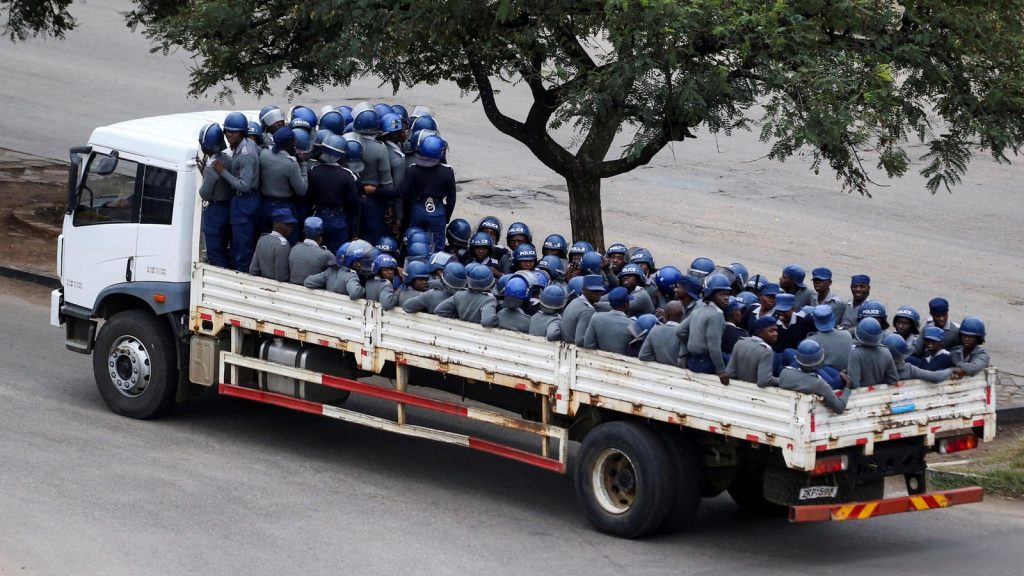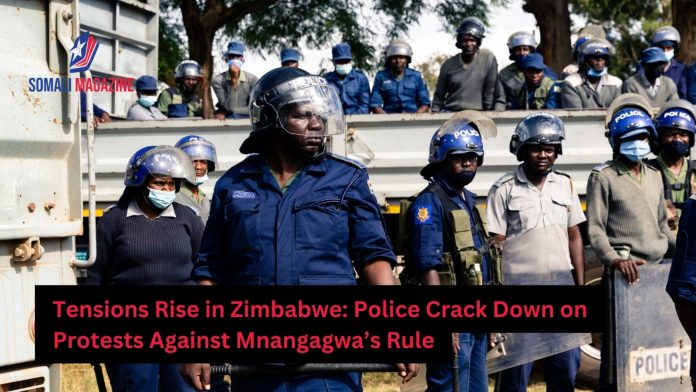Facebook Twitter Instagram Somali Magazine - People's Magazine
Zimbabwe major cities were placed under heavy lockdown on March 31, 2025, as the government deployed anti-riot police to suppress planned demonstrations against President Emmerson Mnangagwa’s administration. The protests, organized by a faction of the ruling ZANU-PF party and supported by war veterans, were aimed at opposing Mnangagwa’s alleged bid to extend his presidency beyond the constitutional two-term limit.
The demonstrations, spearheaded by expelled ZANU-PF member and war veteran Blessed Geza, called for Mnangagwa’s immediate resignation over accusations of corruption and economic mismanagement. Geza, who has gone into hiding, has been addressing Zimbabweans through social media, urging them to rise against what he described as “criminals surrounding the President.” His faction is reportedly aligned with Vice President Constantino Chiwenga, further intensifying the power struggle within the ruling party.
In response, the government mobilized security forces across Harare, Bulawayo, and other cities, setting up checkpoints and conducting vehicle searches for “dangerous weapons.” Businesses, schools, and vendors largely shut down, with streets eerily empty as residents opted to stay indoors. Police quickly dispersed small groups of protesters who attempted to gather in central Harare, using tear gas to prevent any escalation.
The protests come amid growing discontent over Zimbabwe’s deteriorating economic conditions, marked by hyperinflation, unemployment, and a weakening currency. Critics accuse Mnangagwa of failing to deliver on his promises of economic reform and accuse his administration of rampant corruption. The proposed extension of his presidency to 2030 has further fueled public outrage, with many viewing it as a blatant power grab.
The government has dismissed the protests as the work of “unruly elements” supported by external forces. Home Affairs Minister Kazembe Kazembe issued a statement condemning the demonstrations, warning that security forces would take “decisive action” against any acts of violence or terrorism. The government also claimed that cars laden with explosives had been detonated outside the premises of three businessmen linked to Mnangagwa, further escalating tensions.

The crackdown has drawn criticism from human rights organizations, which accuse the government of stifling dissent and violating citizens’ rights to peaceful assembly. Analysts warn that the heavy-handed response could deepen divisions within ZANU-PF and destabilize the country further. The removal of army commander General Anselem Sanyatwe, a Chiwenga ally, last week has already heightened tensions within the ruling party, with some fearing a potential coup attempt.
Despite the government’s efforts to project calm, the protests have sent a strong message of discontent. Political analyst Brian Raftopoulos described the situation as a “real danger” for Mnangagwa’s administration, highlighting the growing chasm between factions aligned with the military and those loyal to the President. “Mnangagwa’s long-term strategy appears to be isolating Chiwenga and consolidating his power, but this approach risks triggering unrest,” Raftopoulos stated.
The events of March 31 underscore the fragility of Zimbabwe’s political landscape, where unresolved succession battles and economic hardships continue to fuel unrest. As the government tightens its grip on dissent, the path forward remains uncertain, with many Zimbabweans calling for accountability and meaningful reform.

